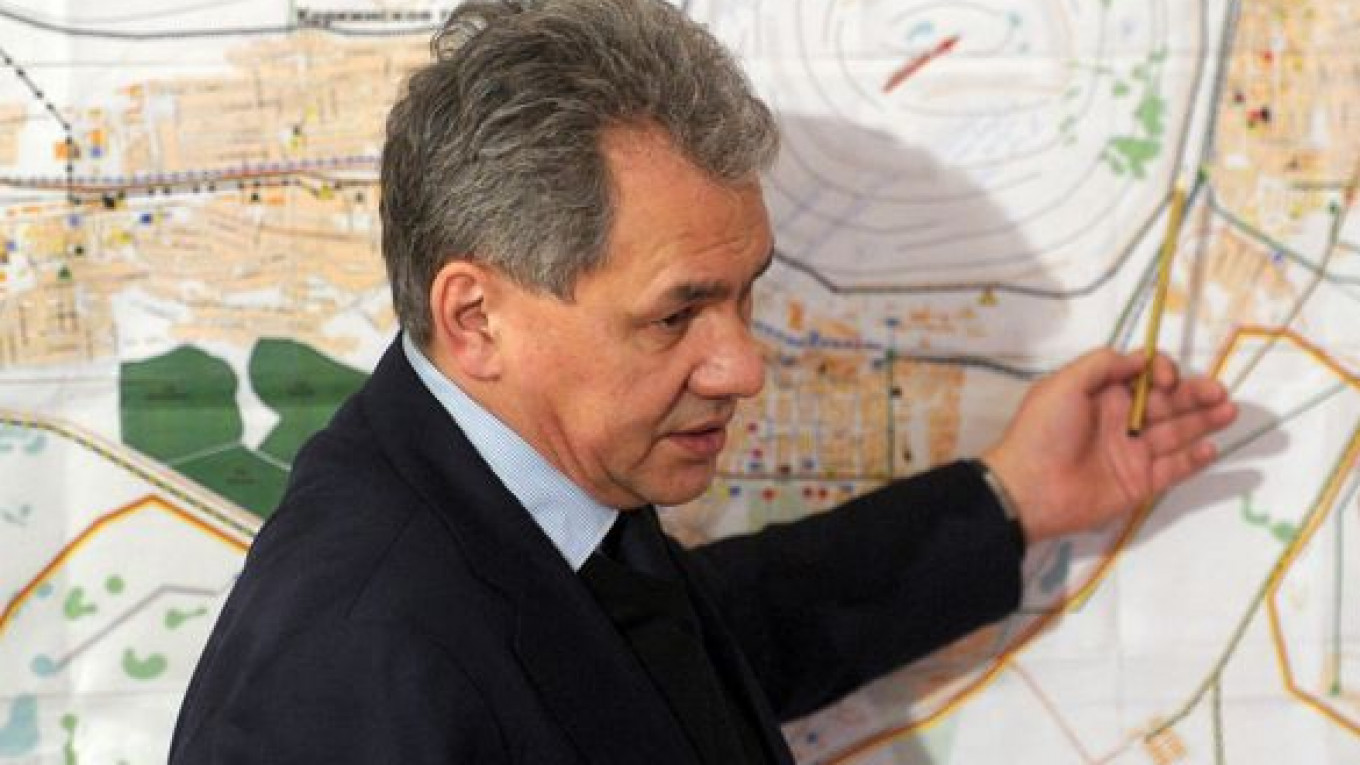President Vladimir Putin has agreed with Moscow region Governor Sergei Shoigu's position that tax losses to the region as a result of the expansion of the city should be reimbursed.
After a meeting last week that included Putin, Shoigu and Moscow Mayor Sergei Sobyanin, Putin ordered the Finance Ministry and the Economic Development Ministry to evaluate the losses and propose to the Kremlin a method of compensation for the period 2012 to 2015, two sources told Vedomosti.
The order is to be fulfilled by Oct.1 and will be publicized shortly, the sources said.
In May, Shoigu confirmed the calculation of his predecessor, Boris Gromov, which put lost tax revenue in 2012 in the territory ceded to the city at 34 billion rubles ($1.06 billion), and the cost savings at 9.4 billion rubles, for a net loss of about 35 billion rubles.
That amount will go up annually by 10 billion rubles, reaching 55 billion rubles by 2015, said Andrei Sharov, a spokesman for the Moscow region government.
A source in the federal government said Sobyanin's calculation of the region's financial loss is half that of Shoigu's.
Meanwhile, the decision to actually move government bodies to the new territory has been delayed until March, sources in the government and the president's administration told Vedomosti.
That decision was made at the same meeting attended by Shoigu and Sobyanin last week, but it has not been publicized.
In his opening address at the meeting, Putin characterized the move as "a necessity of life," adding that "the city is suffocating," according to the Kremlin website.
Vedomosti's sources reported that Sobyanin said putting government buildings outside the ring road would free up the city center from more than 500,000 people and ease road traffic by 30 percent.
Construction of new buildings in the region will cost 420 billion rubles, while sales of the currently used facilities will bring in 578 billion rubles.
Putin expressed doubt about that figure and forecast a sale value of about 500 billion rubles ($15.6 billion). Olga Dergunova, the newly appointed chief of the State Property Committee, put the value of the freed-up real estate at $9 billion to $15 billion.
And massive sales could cause a crash in real estate prices, so the process should be carried out over seven to 10 years.
Putin summarized the discussion by saying the viability of the project can be determined only after a state committee is formed to analyze it, and he proposed that Moscow City Hall be the first administrative body to move to the new territory.
A source at a federal ministry told Vedomosti that Putin ordered another review of the idea of moving bureaucrats to the new territory, including a calculation of the costs and proposals for which administrative buildings would go where.
Moscow region Governor Sergei Shoigu is proposing to the federal government that a duty amounting to 30 percent of the new market-oriented cadastral price be charged for changing the status of a land plot.
Deputy Governor Andrei Sharov said the duty is to be paid by the landowner, and draft legislation on the levy will be completed by the start of the State Duma's fall session.
The average expected duty would be about 35,000 rubles per 100 square meters.
In the first half of 2012, former Governor Boris Gromov purportedly authorized a zoning change for 35 forest plots of more than 500 hectares that converted the plots into village land. Shoigu has said he will investigate the transaction.
A Message from The Moscow Times:
Dear readers,
We are facing unprecedented challenges. Russia's Prosecutor General's Office has designated The Moscow Times as an "undesirable" organization, criminalizing our work and putting our staff at risk of prosecution. This follows our earlier unjust labeling as a "foreign agent."
These actions are direct attempts to silence independent journalism in Russia. The authorities claim our work "discredits the decisions of the Russian leadership." We see things differently: we strive to provide accurate, unbiased reporting on Russia.
We, the journalists of The Moscow Times, refuse to be silenced. But to continue our work, we need your help.
Your support, no matter how small, makes a world of difference. If you can, please support us monthly starting from just $2. It's quick to set up, and every contribution makes a significant impact.
By supporting The Moscow Times, you're defending open, independent journalism in the face of repression. Thank you for standing with us.
Remind me later.






